Universum Film AG

If you like this company, let us know!
Foundation date 18 december 1917
UFA (formerly Universum Film AG, today UFA GmbH) is a German motion-picture production company headquartered in Babelsberg, a district in the Brandenburg state capital of Potsdam.
Universum Film was established on December 18, 1917 as a direct response to foreign competition in the realm of film and propaganda. UFA was founded by a consortium headed by Emil Georg von Stauß, who was a board member at Deutsche Bank.
In 1925, financial pressures compelled the company to enter into distribution agreements with the American studios Paramount and Metro-Goldwyn-Mayer to form Parufamet. UFAs weekly newsreels continued to contain reference to the deal with Paramount all the way up to 1940, at which point "Die Deutsche Wochenschau ("The German Weekly Review") was consolidated and used as an instrument of Nazi propaganda.
In March 1927, Alfred Hugenberg, an influential German media entrepreneur and later Minister of the Economy, Agriculture and Nutrition in Hitler's cabinet, purchased Ufa and transferred it to the Nazi Party in 1933.
In 1942, as a result of the Nazi policy of "forcible coordination" known as the Gleichschaltung, Ufa and all of its competitors, including Tobis, Terra, Bavaria Film and Wien-Film, were bundled together with foreign film production companies seized by the Nazis to form one corporation, Ufa-Film (Ufi), with headquarters in Berlin.
After the Red Army occupied the Ufa complex in 1945, and after the privatization of Bavaria and Ufa in 1956, the company was restructured to form Universum Film AG and taken over by a consortium of banks.
In 1964, Bertelsmann's Chief Representative, Manfred Köhnlechner, acquired the entire Universum Film AG from Deutsche Bank, which had previously been the main Ufa shareholder and which had determined the company's business policy as head of the shareholders' consortium. Köhnlechner bought Ufa, which was strongly in debt, on behalf of Reinhard Mohn for roughly five million Deutschmarks. (Köhnlechner: "The question came up as to why not take the entire thing, it still had many gems"). Only a few months later, Köhnlechner also acquired the Ufa-Filmtheaterkette, a movie theater chain, for almost eleven million Deutschmarks.
Today, UFA GmbH (UFA) is the parent company uniting all production activities of Bertelsmann/FremantleMedia in Germany. Up until August 2013, eight subsidiaries operated under the UFA umbrella: UFA Fernsehproduktion, UFA Entertainment, Grundy UFA, Grundy Light Entertainment, UFA Cinema, Teamworx, Phoenix Film and UFA Brand Communication.
In August 2013, UFA underwent an organizational restructuring that simplified the company down to three production divisions. Today, UFA Fiction, UFA Serial Drama and UFA Show & Factual are the three units responsible for production.
Best films
Filmography of Universum Film AG (348 films)
Production
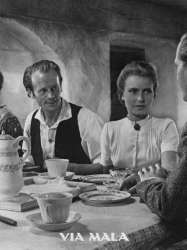
Via Mala (1945)
, 1h48Directed by Josef von Báky
Genres Drama, Crime
Themes Films about families, Films about domestic violence
Actors Viktor Staal, Hilde Körber, Albert Florath, Karl Hellmer, Carl Kuhlmann, Renate Mannhardt
In a rural village, the tyrannical Jonas Lauretz intimidates his family, mistress and neighbours. After he disappears one night, it is widely believed that his eldest daughter, Silvelie, has murdered him. A new investigating judge arrives in the village, he falls in love with Silvelie. He becomes torn between his love for her and his duty to investigate the potential crime. Eventually it emerges that it was not Silvelie who murdered Jonas Lauretz but the village innkeeper Bündner. He is forgiven by everyone because they all shared his desire to murder him.

Burning Hearts (1945)
, 1h50Directed by Veit Harlan
Genres Drama, War, Historical, Romance
Themes Politique, Political films, Histoire de France, Napoleonic Wars films, French Revolution films
Actors Kristina Söderbaum, Heinrich George, Paul Wegener, Gustav Diessl, Horst Caspar, Claus Clausen
The film begins in 1813 after the phase of the Napoleonic Wars known in German as the Befreiungskriege (War of Liberation). The opening scenes show Prussian Landwehr and volunteers marching down the streets of Breslau through enthusiastic crowds. This is followed by a dialogue between King Frederick William III of Prussia and Count August von Gneisenau, in which Gneisenau explains that the siege of Kolberg taught the importance of citizen armies. Ending with the admonition that kings who cannot lead must abdicate, the scene switches to Vienna in 1806 to show the abdication of the last Holy Roman Emperor, Francis II of Austria, whom the script has Gneisenau call "an Emperor who abandoned the German people in their hour of need".

Die Schenke zur ewigen Liebe (1945)
Directed by Alfred Weidenmann
Origin German
Genres Drama
Actors Carl Raddatz, Claude Farell, Maria Koppenhöfer, Berta Drews, Josef Sieber, Robert Taube
Mathias Bentrup travaille comme mineur dans la Ruhr. Il tombe amoureux de Bärbel Hofkirchner, une touriste du sud de l'Allemagne. Il vient auprès d'elle, travaille dans la montagne. Mais un jour il décide de revenir dans sa région natale et l'annonce à Bärbel. Il tient beaucoup à cette femme qu'il est sur le point d'épouser. Il passe l'examen de porion mais échoue.

The Woman of My Dreams (1944)
Directed by Georg Jacoby
Origin German
Genres Comedy, Musical theatre, Musical, Romance
Themes Films about music and musicians, Musical films
Actors Marika Rökk, Wolfgang Lukschy, Walter Müller, Georg Alexander, Grethe Weiser, Lotte Spira
La vedette d'un music-hall, Julia Koester (Marika Rökk), se querelle avec son imprésario. Elle quitte le théâtre et monte dans un train. Sans affaires, la jeune femme se retrouve dans la petite gare de montagne d'un village enneigé. Erwin Forster (Walter Müller), un ingénieur, tombe fou amoureux d'elle, tandis que son collègue Peter Groll (Wolfgang Lukschy) critique les mauvaises manières de la chanteuse. Cependant, petit à petit celui-ci est conquis par Julia. Elle retourne en ville et c'est alors qu'il réalise qu'elle est la femme de ses rêves.

The Wedding Hotel (1944)
, 1h24Directed by Carl Boese
Genres Comedy
Actors Walter Janssen, Ernst Waldow, Hans Fidesser
A group of artists and journalists enjoy a series of romantic entanglements in a country hotel. An author, Vera von Eichberg "of whom no photo exists," has mentioned the hotel in her work, increasing its clientele. When another female guest arrives, everyone assumes she is the author, despite her repeated assertions to the contrary.
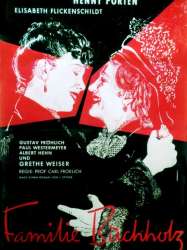
The Buchholz Family (1944)
, 1h32Origin German
Genres Drama
Actors Henny Porten, Paul Westermeier, Gustav Fröhlich, Grethe Weiser, Marianne Simson, Hans Zesch-Ballot
Berlin à la fin du XIX siècle. Wilhelmine Buchholz, la mère de famille de deux enfants, femme au foyer, fut satisfaite de remplir son rôle. Maintenant elle souhaite devenir écrivain. Son premier roman pas encore achevé Famille Buchholz parle de sa vie, beaucoup d'amis s'y retrouvent. Julius Stinde, l'éditeur de Wilhelmine, est le premier enthousiasmé par cette chronique familiale. Avec son grand sens de l'organisation, elle mène aussi les vies du mari Carl et des deux filles Emmi et Betti. Son amie Kathinka lui donne son avis éclairé.
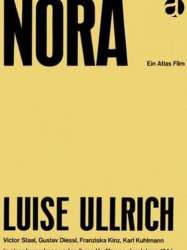
Nora (1944)
, 1h41Directed by Harald Braun
Genres Drama
Themes Films based on plays
Actors Luise Ullrich, Viktor Staal, Ursula Herking, Gustav Diessl, Georg Thomalla, Ernst Waldow
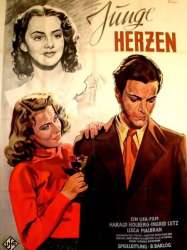
Young Hearts (1944)
, 1h27Directed by Boleslaw Barlog
Genres Drama
Actors Ingrid Lutz, Max Gülstorff, Erika von Thellmann, Paul Westermeier, Walter Janssen, Hans Richter
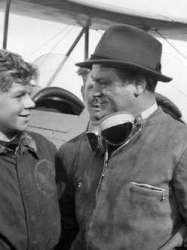
Junge Adler (1944)
, 1h47Directed by Alfred Weidenmann
Origin German
Genres Drama, War
Themes Politique, Transport films, Aviation films, Political films
Actors Willy Fritsch, Dietmar Schönherr, Herbert Hübner, Albert Florath, Karl Dannemann, Aribert Wäscher
Theo Brakke, le fils arrogant d'un directeur d'usine d'aviation, remporte une régate d'aviron. En raison de mauvais résultats scolaires, il n'était pas autorisé à y participer. Son père l'emmène au conseil de classe et le punit en l'envoyant travailler à l'usine parce qu'il espère lui faire connaître l'esprit de camaraderie.

Neigungsehe (1944)
, 1h34Origin German
Genres Drama
Actors Henny Porten, Paul Westermeier, Gustav Fröhlich, Grethe Weiser, Hans Zesch-Ballot, Albert Hehn
Trois ans plus tard. Franz et Emmi Wrenzchen sont devenus parents de jumeaux Roland et Rolf. Lorsque les deux garçons manquent de tomber hors de la fenêtre par la négligence de Wilhelmine, il y a encore une fois une dispute entre le père Buchholz et son gendre. Betti, la fille aînée de Wilhelmine, commence à suivre une formation pour devenir chanteuse. Par hasard, Wilhelmine découvre que l'histoire d'amour entre Betti et le peintre Holle qui était parti en Italie n'est pas terminée. Au moment où ils s'embrassent en public, éclate un petit scandale.

Titanic (1943)
, 1h25Directed by Herbert Selpin, Werner Klingler
Origin German
Genres Drama, Action, Historical
Themes La fin du monde, Seafaring films, Politique, Transport films, RMS Titanic in fiction, Documentary films about war, Documentary films about historical events, Political films, Documentary films about World War II, Disaster films, Films about seafaring accidents or incidents
Actors Sybille Schmitz, Hans Nielsen, Kirsten Heiberg, Otto Wernicke, Franz Schafheitlin, Ernst Fritz Fürbringer
The film opens with a proclamation to the White Star stockholders that the value of their stocks is falling. The president of White Star Line J. Bruce Ismay promises to reveal a secret during the maiden voyage of the Titanic that will change the fate of the stocks. He alone knows that the ship can break the world record in speed and believes this will raise the stock value. Ismay and the board of the White Star plan to lower the stocks by selling even their own stocks in order to buy them back at a lower price. They plan to buy them back just before the news about the record speed of the ship will be published to the press.

Immensee (1943)
, 1h28Directed by Veit Harlan
Genres Drama, Romance
Themes Films about music and musicians
Actors Kristina Söderbaum, Carl Raddatz, Otto Gebühr, Germana Paolieri, Vadim Glowna, Max Gülstorff
Elisabeth (Kristina Söderbaum) falls in love with Reinhardt (Carl Raddatz), but he leaves their native village to study music, travel the world and build his career as a composer. His most important compositions are inspired by his love for her, Twelve Songs of Elisabeth and Seerosen (water lilies, the couple's special flower), but after she visits him on the day of his final examination at the conservatoire and finds a strange woman asleep in his bed, Elisabeth marries Erich (Paul Klinger), the wealthy heir to the estate of Immensee. Reinhardt returns to win her back, and Erich releases her, telling her that all that he wants is for her to be happy. This causes Elisabeth to realise what love really means and she tells Erich for the first time that she loves him, and remains with him. In the frame story, many years have passed, Erich is dead and Elisabeth and Reinhardt, who is now a renowned composer, meet for tea at his hotel after a performance of his Seerosen; at the end of the film, she tells him she will remain true to Erich and to Immensee, and he leaves for the last time.

Diesel (1943)
, 1h49Directed by Gerhard Lamprecht
Genres Drama, Historical
Actors Willy Birgel, Paul Wegener, Josef Sieber, Arthur Schröder, Erich Ponto, Hubert von Meyerinck
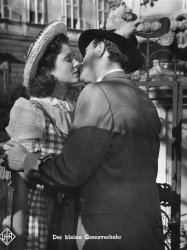
A Salzburg Comedy (1943)
, 1h23Directed by Hans Deppe
Genres Comedy, Romantic comedy
Actors Willy Fritsch, Heinz Salfner, Hilde Sessak, Hans Leibelt, Charlott Daudert, Hans Richter
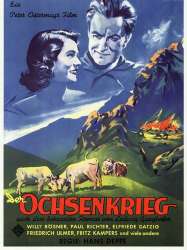
The War of the Oxen (1943)
, 1h35Directed by Hans Deppe
Genres Drama
Actors Elfriede Datzig, Paul Richter, Friedrich Ulmer, Fritz Kampers, Ludwig Schmid-Wildy, Ernst Stahl-Nachbaur
 Connection
Connection





